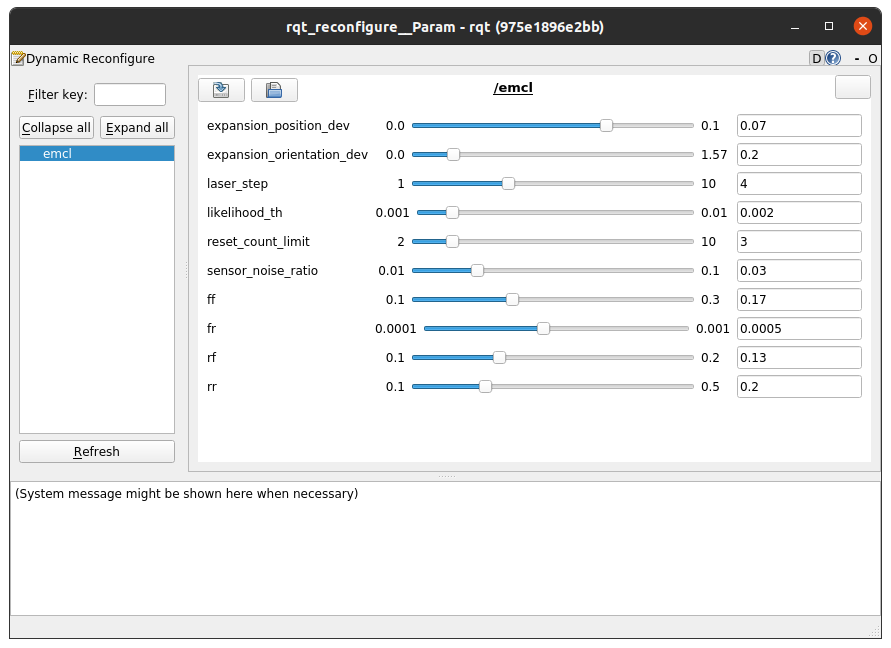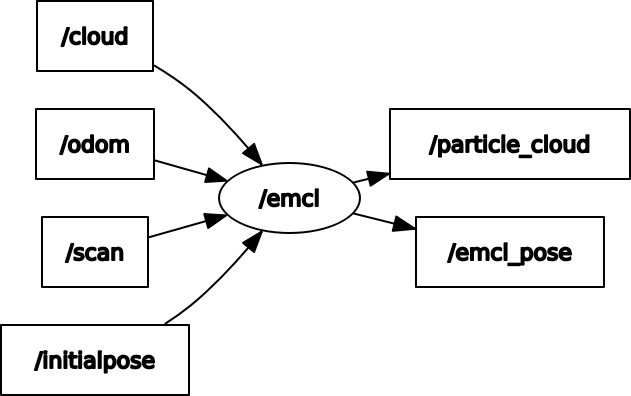ROS implementation of emcl (mcl with expansion resetting)
Support Dynamic Reconfigure
- Ubuntu 20.04
- ROS Noetic
# clone repository
cd /path/to/your/catkin_ws/src
git clone https://github.com/ToshikiNakamura0412/emcl_ros.git
# build
cd /path/to/your/catkin_ws
rosdep install -riy --from-paths src --rosdistro noetic # Install dependencies
catkin build emcl_ros -DCMAKE_BUILD_TYPE=Release # Release build is recommended
roslaunch emcl_ros emcl.launch
# clone repository
cd /path/to/your/catkin_ws/src
git clone https://github.com/ToshikiNakamura0412/scan_to_pcl_ros.git
git clone https://github.com/ToshikiNakamura0412/gyrodometry_ros.git
git clone -b noetic-devel https://github.com/ROBOTIS-GIT/turtlebot3_msgs.git
git clone -b noetic-devel https://github.com/ROBOTIS-GIT/turtlebot3.git
git clone -b noetic-devel https://github.com/ROBOTIS-GIT/turtlebot3_simulations.git
# build
cd /path/to/your/catkin_ws
rosdep install -riy --from-paths src --rosdistro noetic
catkin build -DCMAKE_BUILD_TYPE=Release
# run demo
## terminal 1
export TURTLEBOT3_MODEL=burger
roslaunch emcl_ros test.launch
## terminal 2
export TURTLEBOT3_MODEL=burger
roslaunch turtlebot3_teleop turtlebot3_teleop_key.launch
roslaunch emcl_ros test.launch use_gyrodom:=true
- /emcl_pose (
geometry_msgs/PoseWithCovarianceStamped)- The estimated pose of the robot
- /tf (
tf2_msgs/TFMessage)- tf (from the global frame to the odom frame)
- ~<name>/particle_cloud (
geometry_msgs/PoseArray)- The particle cloud of mcl
- /cloud (
sensor_msgs/PointCloud2)- The input pointcloud data
- If ~<name>/use_cloud is false, this topic is not used
- /initialpose (
geometry_msgs/PoseWithCovarianceStamped)- The initial pose of the robot
- /odom (
nav_msgs/Odometry)- The odometry data
- /scan (
sensor_msgs/LaserScan)- The input laser scan data (default)
- ~<name>/expansion_position_dev (float, default:
0.07[m]):
The standard deviation of the expansion noise in position - ~<name>/expansion_orientation_dev (float, default:
0.2[rad]):
The standard deviation of the expansion noise in orientation - ~<name>/init_x (float, default:
0.0[m]):
The initial x position of the robot - ~<name>/init_y (float, default:
0.0[m]):
The initial y position of the robot - ~<name>/init_yaw (float, default:
0.0[rad]):
The initial yaw of the robot - ~<name>/init_position_dev (float, default:
0.1[m]):
The standard deviation of the initial noise in position - ~<name>/init_orientation_dev (float, default:
0.05[rad]):
The standard deviation of the initial noise in orientation - ~<name>/laser_step (int, default:
4):
The step of the laser scan - ~<name>/likelihood_th (float, default:
0.002):
The threshold of the likelihood - ~<name>/particle_num (int, default:
420):
The number of particles - ~<name>/reset_count_limit (int, default:
3):
The limit of the reset count - ~<name>/sensor_noise_ratio (float, default:
0.03):
The ratio of sensor noise to the actual sensor noise - ~<name>/use_cloud (bool, default:
False):
If true, use pointcloud instead of laser scan
- ~<name>/ff (float, default:
0.17[m]):
Standard deviation of forward noise per forward - ~<name>/fr (float, default:
0.0005[m]):
Standard deviation of forward noise per rotation - ~<name>/rf (float, default:
0.13[rad]):
Standard deviation of rotation noise per forward - ~<name>/rr (float, default:
0.2[rad]):
Standard deviation of rotation noise per rotation
If pointcloud is used, following parameters are used.
- ~<name>/range_min (float, default:
0.12[m]):
The minimum range of the sensor - ~<name>/range_max (float, default:
3.5[m]):
The maximum range of the sensor
- ~<name>/use_dynamic_reconfigure (bool, default:
False):
If true, use dynamic reconfigure
- 上田隆一, "詳解 確率ロボティクス Pythonによる基礎アルゴリズムの実装", Kodansya, 2019
- https://github.com/ryuichiueda/emcl
- 赤井直紀, "LiDARを用いた高度自己位置推定システム - 移動ロボットのための自己位置推定の高性能化とその実装例", コロナ社, 2022
- https://github.com/NaokiAkai/ALSEdu






